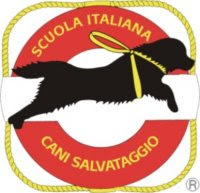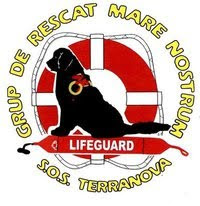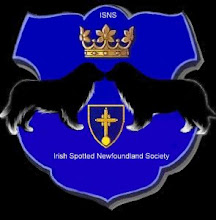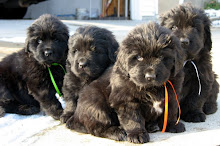

From "The Twentieth Century Dog (Non-Sporting) - Compiled From The Contributions Of Over Five Hundred Experts," Volume 1, Herbert Compton (1904):
"Miss E. Goodall's Ideal Newfoundland - Royal in mien, gentle in manners, docile yet full of dignity, true as steel and faithful unto death, my ideal Newfoundland dog looks as noble as the work for which he was born - the work of rescue. When the Creator endowed him with that sublime instinct which leads him without training or direction, but out of his own consciousness, to save life at sea or in perilous waters, He bestowed on the dog an attribute that makes it not merely the king of dogs, but first in the animal kingdom. Not only to save his master is his understood duty, - there are many gallant hounds who are competent to understand that call upon their intelligence - but to succour the stranger in danger, and to carry from the shore, through surf and breakers and angry waves, assistance to wrecked vessels, labouring at the self-imposed task with a reasoning power and indomitable courage and perserverance that is not to be equalled in the annals of dumb creation. Truly and emphatically a Member of the Royal Humane Society, and worthy to be ranked with the lifeboatsman of our coasts, and the heroes of our Fire Brigades.
My ideal Newfoundland must be great in body as well as soul, with a grand and massive head; broad benevolent brow; small, dark, very intelligent eyes, ordinarily soft with affection but capable of flaming with anger on occasion; small ears hanging close to his head; deep muzzle, not too long; and the whole head and face covered with short hair that feels like velvet to the touch.
His neck is rather long and very muscular; his body proportionate and compact, with well-sprung ribs, and clothed with a dense, flat, water-resisting coat of a deep, rich black colour, long in the neck, where it almost assumes the proportions of a mane; plenty of feather on the tail and fore legs, which must be straight and strong with ample bone, for with these he chiefly battles with the waves, and wins his way. His hind legs are not quite so powerful, and less feathered.
He must be a low-built dog, for anything like legginess would detract from his appearance - that grand, solid, reassuring bulk suitable for a life in the sea. No water animal in the world is long-legged, least of all should the Newfoundland be so. His gait is that of a bear, without the clumsiness; that is to say, he advances the front and hind legs of the same side simultaneously. It is a sea-dog's walk, but he is active withal, as you shall find our British sailors when there is work to do on land with a naval brigade. And let him but glimpse the sea, and you can realise the spirit that is in him, as his exuberant delight carries him with a rush to his favourite element.
For the rest, affectionate, tractable, and especially kind to children, he endears himself to all. As a guardian unsurpassable; always mute except when there is actual danger to be apprehended. Finally - and this is the greatest tax upon his nature - my ideal Newfoundland is not quarrelsome with others of his kind, but bears with them all, his lofty spirit comprehending that though he is their king, out of consideration for his mistress's prejudices he must not insist upon being their autocrat."





































No comments:
Post a Comment